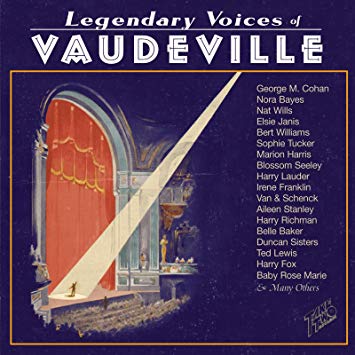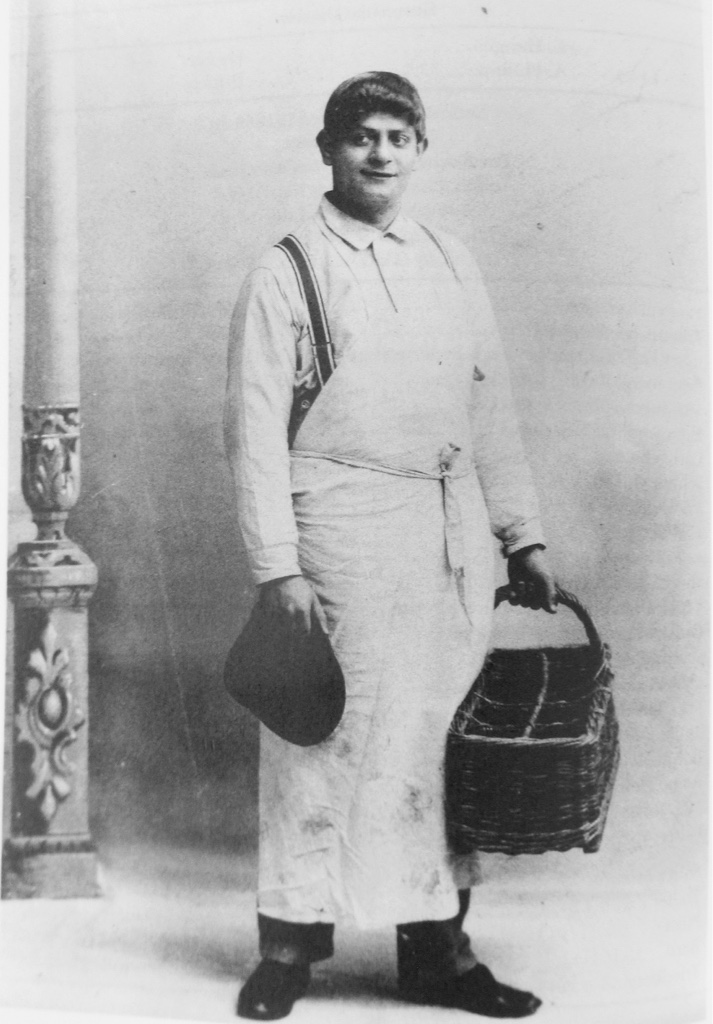Kevin Clarke
Operetta Research Center
23 June, 2018
You might remember the CD series The Broadway Musicals of… created, written and hosted by Scott Siegel. They started, thematically, somewhere in the 1920s and moved onwards to the 1940s. Each disc was a compilation of roughly 20 songs and duets from shows that premiered that year. The performances were live (and very alive!), there was a bit of narrative in-between to point out what’s special about the numbers and their composers. I thoroughly enjoyed the series and remember buying as many CDs as I could lay my hands on back in the early 2000s. Now, Operetta Archives in Los Angeles presents a disc of similar concept and content: Broadway Sampler: 1915. It contains “Twenty-Five Musicals! – Twenty-Six Songs!!” as the subtitle promises.

“Broadway Sampler: 1915″ by Operetta Archives.
Why 1915, you may ask. In the booklet producer Mike Miller writes: “In 1915, twenty-five musical stage works opened on Broadway—shows labeled as operettas, comic operas, musical plays, musical revues, comedies with music—with stylings that pointed backwards, forwards, and sideways. Jerome Kern, Cole Porter, Irving Berlin, Sigmund Romberg, and Rudolf Friml were in the early stages of their careers, and Victor Herbert was heading toward his final years. Very little of the more than 300 songs written for these shows has been recorded on modern media. This CD takes a step toward addressing this shortfall by offering one song from each of the works that opened in 1915—plus, from one of the shows, a second song: Cole Porter’s first Broadway tune.”
Obviously, we here at the Operetta Research Center love this mixing of “operettas, comic operas, musical plays, musical revues, comedies” because that represents how operetta music was once perceived, as part of a larger picture. It’s also how operetta was once performed, by actors and singers active in all these different fields. The four soloists on this Operetta Archives disc are the young Emily Hagens, Ryan Reithmeier, Todd Strange, Elyse Willis; the sound like they’re fresh out of an opera training program at university; I doubt that they would have had a top billing career on competitive Broadway back in 1915 because they lack audible personality, and they miss the extravagant Vaudeville style most (star) performers back then cultivated. You can admire many of them on the double disc Legendary Voices of Vaudeville by Take Two Records, starting with tracks from 1911, featuring George M. Cohan, and moving up till 1933 and Baby Rose Marie. There are no 1915 tracks on that album!

“Legendary Voices of Vaudeville” on Take Two Records.
It’s amazing to witness how these old performers come across fresh and alive, despite the sometimes terrible sound quality, when compared to the modern-day singers with the best technical recording possibilities. It’s obviously a matter of taste, and Broadway Sampler: 1915 represents the taste of musical director Adam Aceto and producer Mike Miller, who both don’t seem to be fans of outlandish personalities in front of their microphones. It’s all a bit ‘tame’ by comparison. Yet the songs themselves are certainly not ‘tame’ and interesting to hear, accompanied by Adam Aceto and Jan Roper at the pianos. And each song/show is individually described in the booklet, as usual with many glorious details, by Mike Miller. If you know the other Operetta Archives discs you know that these descriptions are marvellous.
I personally liked Elyse Willis best, because she has the most ‘bouncy’ Broadway temperament and the most sparkly character on record, while Emily Hagens and especially Ryan Reithmeier come across as too ‘stiff’ and ‘uninvolved’ when they should ideally be ‘selling’ their material. But they all have pleasant voices that record well, so – to not be misunderstood – it is not a torture to listen to them. Far from it. But considering that this was recorded in Los Angeles, it’s sad to realize that from the millions of young singers running around in the pop, musical, and show industry there no performers were selected who are more ‘special.’ (Whatever their specialty might be.)

Berlin based composer Jean Gilbert in 1913.
Below are the titles you get on the disc; interestingly there are Jean Gilbert songs included, reminding us how successful this now-forgotten Berlin operetta composer was in these years, also on Broadway. (He’s the father of Robert Gilbert, lyricist of Im weißen Rössl, Der Kongress tanzt, Feuerwerk and many famous ‘Schlager’ by Werner Richard Heymann.) There are also tracks with music from Adolf Philipp shows, as a reminder of his equally forgotten success with German language immigrant operettas in New York City, even if the songs here are in English: Philipp had moved on!

Adolf Philipp as Hein Snut in “Der Corner Grocer aus der Avenue A” (The Corner Grocer from Avenue A). From: John Koegel: “Music in German Immigrant Theater; New York City 1840-1940.”
1. Ninety in the Shade: “Where’s the Girl for Me?” (M: Jerome Kern L: Harry B. Smith)
2. Maid in America: “I’m Looking for Someone’s Heart” (M: Sigmund Romberg L: Harold Atteridge)
3. Jack’s Romance: “You and I” (M: Linda Bloodgood L: Fiske O’Hara)
4. The Peasant Girl: “Listen Dear” (M: Rudolf Friml L: Herbert Reynolds)
5. Fads and Fancies: “Alimony Alley” (M: Raymond Hubbell L: Glen MacDonough)
6. Nobody Home: “The Magic Melody” (M: Jerome Kern L: Schuyler Greene)
7. A Modern Eve: “Good-Bye Everybody” (M: Jean Gilbert L: Will M. Hough)
8. The Passing Show of 1915: “The Trombone Man” (M: J. Leubrie Hill L: Harold Atteridge)
9. Ziegfeld Follies of 1915: “Hello, Frisco” (M: Louis A. Hirsch L: Gene Buck)
10. Hands Up: “I’m Simply Crazy over You” (M: Jean Schwartz L: William Jerome, E. Ray Goetz)
11. Hands Up: “Esmerelda” (M&L: Cole Porter )
12. The Blue Paradise: “My Model Girl” (M: Sigmund Romberg L: Harold Atteridge)
13. The Girl Who Smiles: “Teach Me to Smile” (M: Jean Briquet, Adolf Philipp L: Edward A. Paulton, Adolf Philipp)
14. Cousin Lucy: “Society” (M: Jerome Kern L: Schuyler Greene)
15. Two Is Company: “Dimple” (M: Jean Briquet, Adolf Philipp L: Edward A. Paulton, Adolf Philipp)
16. (Ned Wayburn’s) Town Topics: “Melody of the Century” (M: Harold Orlob L: Thomas J. Gray)
17. The Princess Pat: “Make Him Guess” (M: Victor Herbert L: Henry Blossom)
18. Hip-Hip Hooray: “The Ladder of Roses” (M: Raymond Hubbell L: R. H. Burnside)
19. Miss Information: “Two Big Eyes” (M: Cole Porter L: John L. Golden)
20. A World of Pleasure: “Girl of the Fan” (M: Sigmund Romberg L: Harold Atteridge)
21. Alone at Last: “Kiss Me, Dear” (M: Franz Lehár L: Matthew C. Woodward)
22. Around the Map: “Here Comes Tootsi” (M: Herman Finck L: C. M. S. McLellan)
23. Katinka: “’Tis the End, so Farewell” (M: Rudolf Friml L: Otto Hauerbach)
24. Very Good Eddie: “Isn’t It Great to Be Married?” (M: Jerome Kern L: Schuyler Greene)
25. Stop! Look! Listen!: “And Father Wanted Me to Learn a Trade” (M&L: Irving Berlin)
26. Ruggles of Red Gap: “Everybody Hum with Me” (M: Sigmund Romberg L: Harold Atteridge)
To order the CD directly from Operetta Archives, click here.

kevin, thanks a lot for the article post.Much thanks again. Fantastic.
What an absolutely wonderful idea!!!!
And TWO Adolph Phillipp numbers …
Next please, a complete of ALMA WO WOHNST DU!
Let’s put the ‘father of US musical comedy’ back on his pedestal!
Haven’t heard the disc yet, but will review it when (if?) it arrives …
Wonderful enterprise!
VERY GOOD, EDDIE was revived in London many years ago and I was lucky enough to see it several times. Kern’s music is superb – some of his very best – and the Wodehouse/Bolton book and lyrics very witty. There is an excellent Broadway cast recording of the same production: highly recommended!